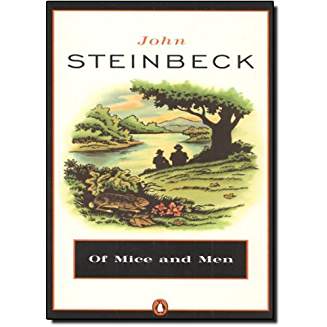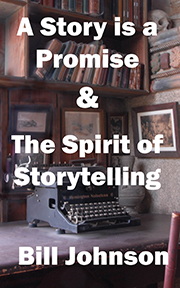|
|
|
Writing for Film Writing for the Stage The Craft of Writing Fiction |
| About the Author |
Character Description as Dramatic Truth
Notes on John Steinbeck's Of Mice and Men
by Bill Johnson 
 Character details ring true when they convey the truth about who a person is.
John Steinbeck's introduction of the two main characters in Of Mice and Men offers a wonderful example.
"They had walked in single file down the path, and even in the open one stayed behind the other."
This subtle point conveys who is the leader of the two men.
"Both were dressed in denim trousers and in denim coats with brass buttons."
In the time of this novel, the Great Depression, denim was the attire of the working class and poor, not a fashion statement.
"Both wore black, shapeless hats and both carried tight blanket rolls slung over their shoulders."
The blanket rolls identify the men as workers who sleep where they can at night as they seek jobs.
"The first man was small and quick, dark of face, with restless eyes and sharp, strong features. Every part of him was defined: small, strong hands, slender arms, a thin and bony nose."
These details convey not only what this man looks like but what kind of man he is. With this description, an actor would understand how to play this character. Just as important, a reader can also experience this character on that internal movie screen readers use to visualize a story character.
When writing a novel and introducing a main character, consider how an actor would interpret your description of a character and any dialogue? Would the actor be able to play that character in a way that communicated who he or she is and their purpose in your story?
If not, the danger is that your actor isn't performing for your audience but performing your personal drama, facing you at the rear of the stage instead of the audience.
"Behind him walked his opposite, a huge man, shapeless of face, with large, pale eyes, and wide, sloping shoulders; and he walked heavily, dragging his feet a little, the way a bear drags his paws. His arms did not swing at his sides, but hung loosely."
Again, descriptive details that bring a character to life. Everything about the description conveys that this large man is dull-minded. A subtle point, likening him to a bear also conveys that he could act out in animalistic ways.
"The first man stopped short in the clearing, and the follower nearly ran over him. He took off his hat and wiped the sweat band with his forefinger and snapped the moisture off. His huge companion dropped his blankets and flung himself down and drank from the surface of the green pool; drank with long gulps, snorting into the water like a horse. The small man stepped nervously beside him."
Again the animal comparison for the large man.
"Lennie!" he said sharply. "Lennie, for God' sakes don't drink so much." Lennie continued to snort into the pool. The small man leaned over and shook him by the shoulder. "Lennie. You gonna be sick like you was last night."
Another subtle point, Lennie doesn't always do what the other man says. This foreshadows what is to come, giving this description subtext.
"Lennie dipped his whole head under, hat and all, and then he sat up on the bank and his hat dripped down on his blue coat and ran down his back. "That's good," he said. "You drink some, George. You take a good big drink." He smiled happily."
Lennie is too simple minded to understand why he shouldn't have drank this water.
George goes on to explain to Lennie that it's better to drink running water, advice he has clearly given to Lennie many times.
George is upset that a bus driver dropped them off on a highway several miles from a ranch they are going to looking for work, something Lennie has already forgotten.
In the conversation that follows, it comes out that Lennie has a dead mouse in his pocket, a pet that was alive when he found it. This foreshadows what will happen when Lennie comes across a mousy young woman.
The details in this beautifully written novel ring true because they serve a dramatic purpose.
Even the title serves a purpose, conveying that the men like George and Lennie have about as much value in their world as the mice in the fields.
Brilliant storytelling.
John Steinbeck is a master storyteller.
Top of page
Information about Bill's plays.
Character details ring true when they convey the truth about who a person is.
John Steinbeck's introduction of the two main characters in Of Mice and Men offers a wonderful example.
"They had walked in single file down the path, and even in the open one stayed behind the other."
This subtle point conveys who is the leader of the two men.
"Both were dressed in denim trousers and in denim coats with brass buttons."
In the time of this novel, the Great Depression, denim was the attire of the working class and poor, not a fashion statement.
"Both wore black, shapeless hats and both carried tight blanket rolls slung over their shoulders."
The blanket rolls identify the men as workers who sleep where they can at night as they seek jobs.
"The first man was small and quick, dark of face, with restless eyes and sharp, strong features. Every part of him was defined: small, strong hands, slender arms, a thin and bony nose."
These details convey not only what this man looks like but what kind of man he is. With this description, an actor would understand how to play this character. Just as important, a reader can also experience this character on that internal movie screen readers use to visualize a story character.
When writing a novel and introducing a main character, consider how an actor would interpret your description of a character and any dialogue? Would the actor be able to play that character in a way that communicated who he or she is and their purpose in your story?
If not, the danger is that your actor isn't performing for your audience but performing your personal drama, facing you at the rear of the stage instead of the audience.
"Behind him walked his opposite, a huge man, shapeless of face, with large, pale eyes, and wide, sloping shoulders; and he walked heavily, dragging his feet a little, the way a bear drags his paws. His arms did not swing at his sides, but hung loosely."
Again, descriptive details that bring a character to life. Everything about the description conveys that this large man is dull-minded. A subtle point, likening him to a bear also conveys that he could act out in animalistic ways.
"The first man stopped short in the clearing, and the follower nearly ran over him. He took off his hat and wiped the sweat band with his forefinger and snapped the moisture off. His huge companion dropped his blankets and flung himself down and drank from the surface of the green pool; drank with long gulps, snorting into the water like a horse. The small man stepped nervously beside him."
Again the animal comparison for the large man.
"Lennie!" he said sharply. "Lennie, for God' sakes don't drink so much." Lennie continued to snort into the pool. The small man leaned over and shook him by the shoulder. "Lennie. You gonna be sick like you was last night."
Another subtle point, Lennie doesn't always do what the other man says. This foreshadows what is to come, giving this description subtext.
"Lennie dipped his whole head under, hat and all, and then he sat up on the bank and his hat dripped down on his blue coat and ran down his back. "That's good," he said. "You drink some, George. You take a good big drink." He smiled happily."
Lennie is too simple minded to understand why he shouldn't have drank this water.
George goes on to explain to Lennie that it's better to drink running water, advice he has clearly given to Lennie many times.
George is upset that a bus driver dropped them off on a highway several miles from a ranch they are going to looking for work, something Lennie has already forgotten.
In the conversation that follows, it comes out that Lennie has a dead mouse in his pocket, a pet that was alive when he found it. This foreshadows what will happen when Lennie comes across a mousy young woman.
The details in this beautifully written novel ring true because they serve a dramatic purpose.
Even the title serves a purpose, conveying that the men like George and Lennie have about as much value in their world as the mice in the fields.
Brilliant storytelling.
John Steinbeck is a master storyteller.
Top of page
Information about Bill's plays.
